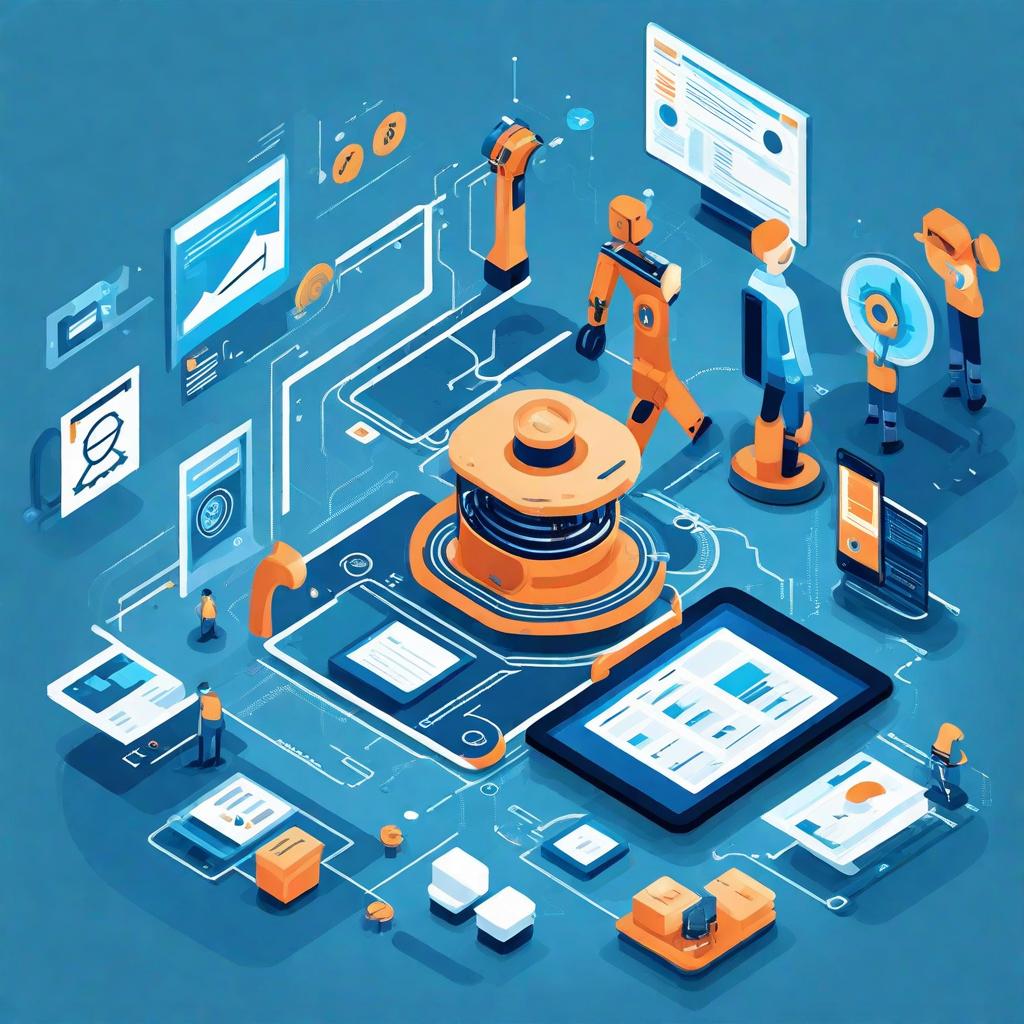Unleashing the Power of Robotic Process Automation (RPA) for Business Transformation
Robotic Process Automation (RPA) is one such innovative technology that has attracted a lot of interest. Businesses are continuously looking for creative ways to improve efficiency and optimize operations in the ever-evolving field of technology. We will go into the realm of RPA in this blog article, examining its uses, advantages, and revolutionary effects on corporate procedures.
Characteristics of Robotic Process Automation:
The key characteristics of Robotic Process Automation (RPA) include:
Role-Based Tasks:
Robotic Process Automation is well-suited for automating rule-based, repetitive tasks. Bots follow predefined rules and instructions to execute tasks, making it ideal for processes with clear logic and well-defined steps.
User Interface Interaction:
RPA bots interact with applications and systems through the user interface, just like a human user. They can mimic mouse clicks, keyboard inputs, and other actions to navigate through software applications.
Non_Invasive Technology:
RPA does not require changes to underlying systems or databases. It operates at the user interface level, making it a non-intrusive technology that can be implemented without significant modifications to existing IT infrastructure.
Configurability:
RPA platforms are configurable and can be adapted to different processes and workflows. They allow organizations to define and modify rules, logic, and instructions for the bots without extensive programming skills.
Scalibility:
RPA solutions are scalable, meaning that organizations can deploy additional bots to handle increased workloads or new processes. This scalability enables flexibility in adapting to changing business needs.
Accuracy & Consistency:
RPA bots perform tasks with a high degree of accuracy and consistency, reducing the likelihood of errors associated with manual data entry and repetitive tasks. This is crucial for maintaining data integrity and compliance.
Task Sequencing and Coordination:
ChatGPT can interact with potential leads on websites or social media channels. It can collect information such as contact information, interests, and purchasing intents, allowing sales teams to more efficiently find and qualify leads.
Content Recommendations:
ChatGPT can recommend appropriate information to users by evaluating user behavior and preferences. For example, on an e-commerce website, it can recommend products based on browsing history and past purchases, enhancing cross-selling and upselling prospects.
Audit Trail and Logging:
RPA platforms often provide detailed logs and audit trails of bot activities. This helps organizations track and monitor the execution of automated processes, ensuring transparency and compliance.
Quick Implementation:
RPA implementations typically have shorter deployment times compared to traditional IT projects. This allows organizations to realize benefits quickly and achieve a faster return on investment.
Integration Capabilities:
RPA is designed to integrate with existing systems and applications, allowing organizations to leverage automation without replacing their entire IT infrastructure. Integration capabilities are crucial for seamless workflow automation.
Cognitive Automation:
Some advanced RPA solutions incorporate elements of artificial intelligence (AI) and machine learning to handle tasks that involve decision-making, natural language processing, and pattern recognition. This is known as cognitive automation.
Human-in-the-Loop (HITL) Collaboration:
RPA can be configured to work in collaboration with human users. In scenarios where human judgment or intervention is required, RPA systems can be designed to involve human input, creating a human-bot collaboration.
Applications Across Industries:
Robotic Process Automation (RPA) can be used in different industries as per needs.
Below are the few use :
Invoice Processing:
RPA can be configured to work in collaboration with human users. In scenarios where human judgment or intervention is required, RPA systems can be designed to involve human input, creating a human-bot collaboration.

Data Entry and Management:
The automation of invoice processing through Robotic Process Automation allows organizations to streamline accounts payable/receivable functions, ensuring faster processing times and minimizing human errors in financial transactions.
Customer Service and Support:
RPA bots handle routine customer queries, freeing up human agents for more complex and personalized interactions.
Automated Query Resolution:
Bots are deployed to validate financial data, ensuring accuracy and compliance with regulatory standards.
Financial Data Validation:
RPA is increasingly being used in human resources to automate repetitive HR tasks, including employee onboarding, payroll processing, and benefits administration. This enables HR professionals to focus on strategic initiatives and employee engagement.
Automated Query Resolution:
RPA bots handle routine customer queries, freeing up human agents for more complex and personalized interactions.
Order Processing:
Accelerating order processing through automation leads to faster fulfillment and increased customer satisfaction.
Employee Onboarding:
RPA streamlines the onboarding process by automating paperwork, data entry, and employee record updates.
Payroll Processing:
Bots ensure accurate and timely payroll processing, minimizing errors associated with manual calculations.
Inventory Management:
RPA contributes to efficient inventory tracking, order fulfillment, and supply chain optimization.
Shipment Tracking:
Bots monitor and update shipment information in real-time, enhancing visibility and reducing delays.
Key Benefits of RPA Implementation:
The implementation of Robotic Process Automation (RPA) can bring various benefits to organizations. Here are some key advantages:
The implementation of Robotic Process Automation (RPA) can bring various benefits to organizations.
Here are some key advantages:
Cost Efficiency:
Robotic Process Automation can lead to significant cost savings by automating repetitive tasks, reducing the need for human intervention, and increasing overall operational efficiency. This is particularly beneficial for processes that involve high-volume, rule-based tasks.

Increased Productivity:
With RPA handling routine and time-consuming tasks, human employees can focus on more strategic, creative, and complex aspects of their work. This leads to increased productivity and allows staff to contribute more value to the organization.
Accuracy and Reduced Errors:
RPA bots perform tasks with a high degree of accuracy, significantly reducing the likelihood of errors associated with manual data entry or repetitive processes. This is crucial, especially in industries where precision and data integrity are paramount.
24/7 Operationss:
Robotic Process Automation bots can operate 24/7 without the need for breaks or time off. This continuous operation can lead to faster processing times for tasks and improved responsiveness to business needs, especially in global organizations with distributed operations.
Scalability:
Robotic Process Automation implementations can be easily scaled to accommodate growing business demands. As the volume of tasks increases, organizations can deploy additional bots to handle the workload, providing scalability and flexibility.
Improved Compliance:
RPA can help ensure that processes are consistently executed according to predefined rules and regulations. This is particularly important in industries with strict compliance requirements, such as finance, healthcare, and legal sectors.
Enhanced Customer Experience:
By automating processes related to customer interactions, organizations can provide quicker response times and improved service quality. This contributes to a better overall customer experience.
Quick Implementation:
Robotic Process Automation implementations typically have relatively short deployment times compared to traditional IT projects. This allows organizations to realize benefits quickly and see a return on investment in a relatively short period.
Data Analytics and Insights:
Robotic Process Automation can generate valuable data and insights by tracking and analyzing the automated processes. This data can be used for performance monitoring, optimization, and decision-making.
Integration with Existing Systems:
RPA is designed to work with existing IT systems without requiring major changes. This non-invasive approach makes it easier to integrate RPA into existing workflows and processes.
Employee Satisfaction:
By automating mundane and repetitive tasks, RPA can contribute to employee satisfaction by allowing staff to focus on more engaging and meaningful aspects of their work. This can boost morale and job satisfaction.
Adaptability to Various Industries:
Robotic Process Automation is versatile and can be applied across various industries and business functions, from finance and HR to customer service and supply chain management.
It’s important to note that while Robotic Process Automation offers these benefits, successful implementation requires careful planning, stakeholder engagement, and ongoing monitoring and maintenance to ensure optimal performance.
Conclusion :
ChatGPT and AI technologies are essentially revolutionizing MarTech by automating processes, improving personalisation, giving important insights, and optimizing marketing strategies. These features help firms to design more successful, efficient, and customer-centric marketing campaigns, ultimately leading to increased ROI and market competitiveness.
Incorporating ChatGPT into many elements of MarTech provides for enhanced productivity, improved customer experiences, and data-driven decision-making. It’s crucial to highlight, however, that effective deployment is dependent on aspects like data quality, integration with current systems, and continual monitoring and refinement to ensure that AI-driven solutions correspond with marketing goals and objectives.



